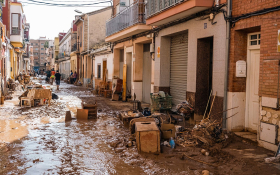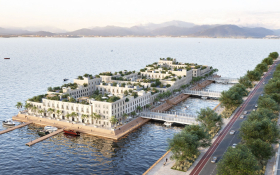Stockholm World Water Week 2016: Implementation of SDG6 on water gets into gear
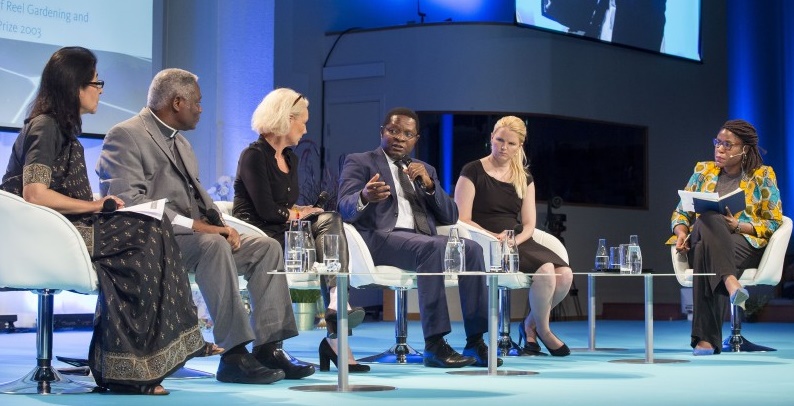
Passionately and with many different views the global water community gathered again at Stockholm world water week to discuss this year’s key issue: the implementation of the UN sustainable development goal #6 on water that aims to provide access to clean water and sanitation to everyone by 2030.
The goal implies an unprecedented amount of new taps and public toilets need to be realised in a very short time span. Additionally the SDG6 addresses the issues of water pollution, water scarcity and preservation of water resources. On top of that many water-related issues need to be addressed as well, such as health and food.
The first day of the Stockholm world water week made clear that the implementation of the SDG #6 is complex but also offer new opportunities. The global water community is very much aware the next two years are crucial to unfold new initiatives and focus on collaboration outside the water sector is necessary to make SDG #6 successful.
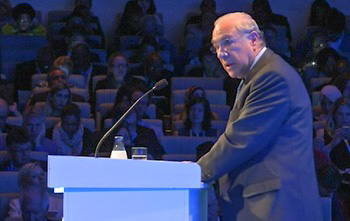 It is all about implementation, implementation and implementation - and not necessarily in that order - said secretary-general Angel Gurria at OECD.
It is all about implementation, implementation and implementation - and not necessarily in that order - said secretary-general Angel Gurria at OECD.
Infrastructure versus commodity
The opening plenary on 29 August clearly showed that the discussion is two folded. On the one hand is the global perspective that trillions of dollars are needed for new water infrastructure and on the other hand the perspective of local communities that need support to run their own water services. Should water be seen as an construction (infrastructure) or is it a commodity (service)?
Fit for finance
“It is estimated that by 2050 40 percent of the global population will life under severe water stress”, reminded secretary-general Angel Gurria at OECD in his speech on water for economic growth.
Trillions of dollars will be needed for new water infrastructure to address water scarcity. Gurria sees it a big challenge to get the construction of this new infrastructure ‘fit for finance’:
“Of course we get it financed, but the question is how, when and what instruments are needed", he said at the opening plenary.
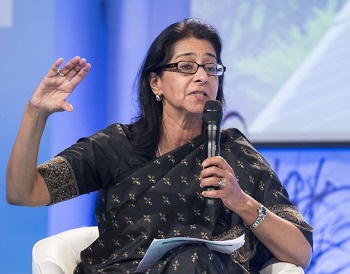 Accept the idea that young social entrepreneurs become millionaires selling desirable water services, Naina Lal Kidwai said provocative.
Accept the idea that young social entrepreneurs become millionaires selling desirable water services, Naina Lal Kidwai said provocative.
Local demand for water services
Naina Lal Kidwai, chair of the Indian chamber of commerce organisation FICCI and chair of the India Sanitation Coalition, took another perspective in her contribution in the panel discussion on water wise implementation and innovation.
She warned that in many parts of the world it will not be possible to quickly realise big water infrastructures. “We need to find the solutions at the domestic level.”
Lal Kidwai mentioned the need for more social entrepreneurs that can work with money from domestic banks and introduce new innovative products. “They can make it happen and bring the water services that are really required much more quickly”.
Lessons from the past
In one of the many sessions of the first day, there was a look back on their failures by organisations that finance water projects in developing countries. The aim of the session was to learn from failure and talk about the necessary reforms.
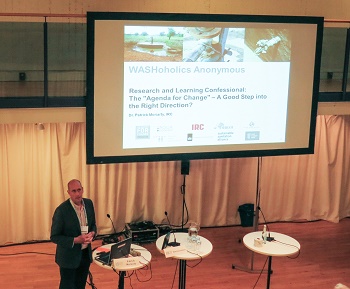 Director Patrick Moriarty of IRC Wash explained why his organisation started several offices around the world to learn better understand the complex interactions around local water issues.
Director Patrick Moriarty of IRC Wash explained why his organisation started several offices around the world to learn better understand the complex interactions around local water issues.
Understanding complex interactions
Director Patrick Moriarty at IRC Wash, a Dutch-based knowledge-focused non-governmental organisation, confessed that his organisation had failed to be active in the field and collect data itself from the people involved.
Moriarty told that his organisation now has several offices in Asia and Africa.
“We get a much better understanding of the complexity of the water issues and the local interactions. We learned how to use our knowledge better and be a facilitator for change”, he explained.
Grant addiction
Senior advisor on water and sanitation, Dick van Ginhoven at the Dutch Ministry of Foreign Affairs touched upon the subject of the dependency by non-governmental organisations and developing countries on grants.
“There is a tendency to wait for projects that are financed by donors", he said. "After five years the project stops and the waiting is for a new project. It is like an addiction that we have to get ride off. Water aid organisations have to get on their own financial feet.”
Van Ginhoven confessed he is an addict too, because as a civil servant for the Dutch government he keeps the system going. He advocated the blending of grants and loans enabling the water aid organisations to better organise their own business. “Become a credit worth service provider”, he advised.
Dutch contribution
During the week the Dutch delegation will be present at the Stockholm world water week and contribute to the discussion on the financial and institutional issues.
To get insight of the Dutch contribution, see the special SWWW page on this website with a day by day programme overview.
Stay tuned as news items on this website will keep you posted on these Dutch contributions.
(top photo by Stockholm International Water Institute/SIWI).
Read also on this website:
- Stockholm World Water Week: Dutch delegation to launch programme on sustainable water use, 25 August 2016
- Stockholm World Water Week
More information
Stockholm World Water Week
www.worldwaterweek.org


